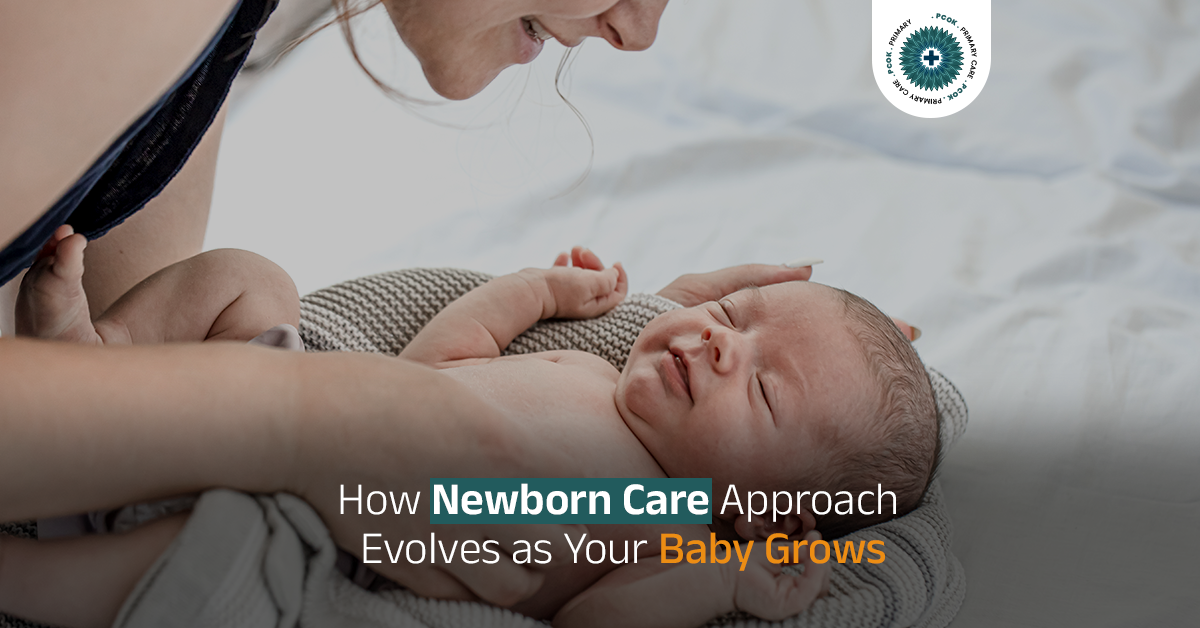Stages of Baby Growth and How Care Evolves
Taking care of a newborn can feel exciting, scary, and full of surprises all at once. As your infant grows, their needs transform.
At Primary Care of Kansas, we understand how quickly these changes come and how important it is to stay informed. That is why our team of infant care specialists is ready to support you as you go through every phase of your baby’s progress, giving them personal attention at every step.
Let’s explore how care evolves through key baby growth stages!
-
The First Few Weeks: Gentle Beginnings
In the first few weeks after birth, babies are still adjusting to the world. Everything is new for them: light, sound, touch, and even breathing on their own.
At this stage, Primary Care of Kansas’s team focuses on comfort, security, and early screenings to help your little one get the healthiest start.
What baby needs:
- Feeding: Whether breastfeeding or bottle-feeding, tiny tummies need food every 2–3 hours.
- Sleep: Newborns snooze 16+ hours a day but in short bursts. Swaddling helps them feel secure.
- Soothing: Gentle rocking, shushing sounds, or baby wearing can calm fussiness.
Trust your instincts! If your baby cries, check for hunger, discomfort, or tiredness. This phase is exhausting, but it’s temporary.
-
1 to 3 Months: Getting to Know the World
Your baby is now more alert and may start to smile! They are slowly learning to lift their head and follow your voice or face.
How care changes:
- Tummy time becomes essential to help build neck strength.
- You may start to notice patterns in your baby’s sleep and feeding.
- Interaction increases as you talk, sing, and make eye contact with your baby.
At Primary Care of Kansas, our pediatric experts offer check-ups and support. We ensure you never feel alone during these critical months.
-
4 to 6 Months: Moving and Munching
Around 4 months, your baby becomes more curious! They recognize your face, grasp toys, and may roll over. Infant development milestones start blooming, and your evolving care approach must adapt.
Changes in care:
- Start solid foods (usually around 6 months), starting with simple purees.
- Continue breast milk or formula along with new tastes.
- Playtime is active now, with soft toys, rattles, and lots of tummy time.
- Baby might begin sleeping longer at night.
At Primary Care of Kansas, we’ll guide you on when and how to start solids and create a personalized feeding plan for your little one’s nutritional needs.
-
7 to 9 Months: Sitting, Crawling, and Exploring
During this stage, babies are curious and eager to explore everything. Safety becomes the top priority, and our care evolves to support physical growth and learning.
How to support growth:
- Baby-proofing tips from our team cover outlets, secure furniture, and remove hazards.
- Introduce toys that support motor skills and sensory play.
- Encourage self-feeding and exposure to a variety of healthy foods.
- Promote early language development with picture books and playful communication.
Ask us about our developmental assessments. We help track and support your baby’s milestones with professional care and guidance.
-
10 to 12 Months: Standing Tall and Saying Words
From standing to first words, your baby is now becoming more independent.
Your role now:
- Encourage walking, but don’t rush it. Bare feet or grip socks help indoors.
- Talk to your baby often. Name objects, point to things, and sing songs.
- Let the baby eat with their hands. It’s messy but helps them learn.
- Keep regular nap and bedtime routines.
This is a big stage for physical and brain development. Babies need your support, love, and attention more than ever.
At Primary Care of Kansas, we’re here to offer strategies that make this transition smoother, both for you and your baby. Our approach focuses on supporting mobility and early communication.
-
After the First Year: A Toddler Emerges
Around 12 months, your baby becomes a toddler. That growing independence reshapes your care approach, and our team continues to walk beside you through each change.
Big adjustments:
- Let your child try simple tasks (like picking out clothes).
- Offer small choices to build confidence and reduce tantrums.
- Stay calm and set clear, gentle boundaries.
- Keep encouraging new words and skills through daily play and reading.
Emotional support is just as important as physical care, especially during toddler transitions. Primary Care of Kansas’s Infant Specialists are happy to help with strategies that nurture both.
Why Flexibility Matters in Baby Care
Just like babies outgrow clothes, they outgrow routines! What worked last month might not work today. At Primary Care of Kansas, we highlight flexible, responsive parenting backed by expert support.
Quick Takeaways:
- Newborn care is about meeting their basic needs.
- For older infants, the focus shifts to safety and learning.
- Toddlers do well when given choices and emotional coaching.
Final Thoughts
Caring for a baby isn’t about being perfect; it’s about being present, loving, and supported. As your baby grows, you’ll face new challenges and adapt. Don’t hesitate to ask for help and learn alongside your child.
Each stage of development of your child is accompanied by us at Primary Care of Kansas.
Our team of experts offers friendly, holistic services, including newborn screening and immunization, developmental evaluation, and so on.
Contact us and visit us so that parenting can be easier and healthier.
FAQs
Q: My baby is not crawling at 9 months old. Is that normal?
All infants grow differently. Others will crawl later or not at all and proceed to standing or walking. We provide developmental check-ups to ensure that your baby is on schedule.
Q: How do I know if my baby’s development is on track?
Every baby develops differently. If you’re concerned, we can screen their progress at Primary Care of Kansas and provide expert guidance.


No comment